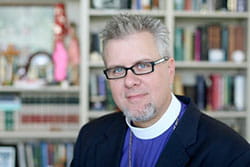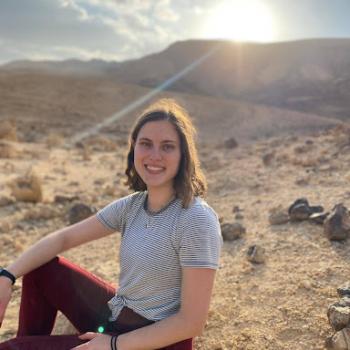 Andy Doyle, the Episcopal Bishop of Texas, has made his name as a young, dynamic, and innovative church leader. The author of Unabashedly Episcopalian: Proclaiming the Good News of the Episcopal Church, an Episcopal bestseller, he has two books on the Church coming out this year: Church: A Generous Community Amplified for the Future this past spring, and A Generous Community: Being the Church in a New Missionary Age in the fall. Last week, Andy and I talked about what the Episcopal Church has to offer a world full of broken people searching for meaning. This week, in the final part of our conversation, we talk about evangelism, mission, and the upcoming Episcopal General Convention.
Andy Doyle, the Episcopal Bishop of Texas, has made his name as a young, dynamic, and innovative church leader. The author of Unabashedly Episcopalian: Proclaiming the Good News of the Episcopal Church, an Episcopal bestseller, he has two books on the Church coming out this year: Church: A Generous Community Amplified for the Future this past spring, and A Generous Community: Being the Church in a New Missionary Age in the fall. Last week, Andy and I talked about what the Episcopal Church has to offer a world full of broken people searching for meaning. This week, in the final part of our conversation, we talk about evangelism, mission, and the upcoming Episcopal General Convention.
Greg Garrett: You employ the term "generous evangelism" in Church. Traditionally, Episcopalians have not been so great at evangelism, yet I know it's a call that you take very seriously. How would you suggest we go about doing generous evangelism?
Andy Doyle: I want to suggest that there are many ways of sharing the Good News of God's love for us and the good news of the Episcopal Church with others — too many ways in fact to mention in this short interview. That being said we have to get over our shame of not sharing and being generous with the Gospel and then open ourselves up to how God wants us to share. Let me give you one concrete example.
Pick a Sunday — it's best if it is a big Sunday when people tend to return to church, so for the sake of the conversation we will say Easter. As a church, create a very pretty invitation to services on that day. You can have moo.com create something beautiful for you or go to your local FEDEX store. Put these in the pews. For a month, or four weeks to six weeks, before Easter you give these to your parishioners. I like to say don't worry about who you are supposed to share this with, just put it in your purse or in your pocket. Your work is to begin to pray to God that the person who is supposed to get this card will be revealed to you. Then go about your work and life — praying about the card. What will happen is a conversation, or something will emerge in your life unexpectedly where you will know that this person in front of you is to get this invitation. And you give it to them — no strings attached. Sometimes we get confused and think that evangelism and invitation is about the results: getting people into church. It is not. It is about sharing what we have with others after we listen to them and to God.
Let's say that you have a heart to do this. You want to share what you have found. Then put on your prayer list, on your refrigerator, by your bed, a prayer that simply says: "Lord, I want to share what I have found in you and in my church. Help me to see how you want me to do this work." I promise that through prayer and listening to God and to others it will emerge clearly what it is that you are to do as a generous person sharing God's love with others.
Generosity is never complicated. It always comes after listening, and is always freely given.
Greg Garrett: I know from earlier conversations and from this book that you feel the old model of people walking through the front doors of our churches on Sunday needs to shift to a model in which we reach out and touch the world all week long. What are some of the ways you are seeing that happen in the Diocese of Texas? What are some ways you personally are trying to be in regular contact and perhaps touching others outside the traditional bishop's role?
Andy Doyle: Let me begin by the fact that I try on a regular basis to meet and be in conversation with people from other denominations and people in our community. I read and listen to a variety of voices out in the world. I also try to work on projects with people outside of my regular experience of church and context in Texas. Global relationships are important too, as they remind me that our way of doing mission and our way of organizing are rooted in our history and relationships.
As to the different work that is going on in Texas, we have five second-site campuses. We have a veterans' missional community emerging, and there are missional communities in prisons and in nursing homes. There are missional communities on school campuses and in neighborhoods. We have two monastic-type missional communities for young adults. We're engaging in conversations with our neighbors in laundromats, street corners, and in burger joints that are leading to new relationships, opened doors, and transformation. We have three congregations investigating multi-use, multi-purpose buildings that meet the needs of their neighbors while creating new profit centers and ministry fields. We have a number of community gardens that are feeding neighborhoods. We also have several people considering homes that live with a rule of life for senior adults and for young adults. And, we have one priest considering a farm ministry.





